 Janus Head Janus Head
11.1&2

Travels Inside the Archive
Robert Gibbons
Edge of Maine Editions

Beyond Time
New & Selected Work
1977 - 2007
Robert Gibbons
 The Age of Briggs & Stratton The Age of Briggs & Stratton
Peter Culley
|

Vivian Maier
1926-2009
Her Discovered Work "This was created in dedication to the photographer Vivian Maier, a street photographer from the 1950s - 1990s. Vivian's work was discovered at an auction here in Chicago where she resided most of her life. Her discovered work includes about 100,000 mostly medium format negatives and a ton of undeveloped rolls of film."
presented by John Maloof
via Heading East
_______________________
Bob Perelman: for Emma Bernstein
1
They say
the mind can keep sense alive
for about seven seconds
and that we can register at most
seven things, coins, pebbles, apples,
or six, five
almost nothing.
2
Maybe that's why
we invented the present
as a place to live, to keep the things we do know,
know so exactly, keep them exactly, keep
all of them, keep what we know
near, at hand, alive in our minds:
Emma.
3
It's hard to remember what,
exactly what, the light looked like
all that time ago, what it was saying in such detail, so instantly, hard
to count
all the blackbirds in that pie, the extra-special one, four and
twenty they said it was, but we only see the
released flock, single flying mass
of bodies, each one the only one, the first and only birth.
...(more)
courtesy of Jerome Rothenberg
Emma Bee Bernstein
(1985-2008)
.....................................................
The Grand Piano Notes 14
John Latta on Bob Perelman
Perelman's reply:
The materiality of the text; the heterogeneity of the self; the absence of final linguistic reference—these have been the subject of lessons often taught and widely learned over the last few decades. However, as abstract payoffs for reading, they are no more interesting than any doxology. So while at the local level “My Poetry” continually distorts, détournes, decontexualizes, undoes definitive statement, it seem insufficient to say, as I just did, that meaning is destabilized and leave it at that, i.e., to emphasize the negative action of the writing.
A “reactive formation” straight out of Barthes’s Roland Barthes (“I postulate a paradox; then this paradox turns bad, becomes a new concretion, itself becomes a new Doxa, and I must seek for a new paradox”) perhaps, but rare enough in the unfraught (rigid) world of “our” poetics....(more) _______________________
Bob Perelman Feature
Edited by Kristen Gallagher
jacket
Bob Perelman’s Grammatology
Rae Armantrout
jacket
Language may be what makes us human, but language also imprints time on the body of experience. Imprints, encodes, brands. In the poems of Bob Perelman, the tenses (as they encode time) frequently appear as a burden or a threat. In ‘Indirect Address: A Ghost Story,’( from Iflife) the speaker is found, “dragging a motley pageant of tenses/Across the first sentence/Which is only just now finishing.//Before it began” The speaker here is a grammatical Sisyphus; the long march to the Present still looms before him.
These lines have an odd resonance with the novels that comprise Remembrance of Things Past. For Proust’s narrator, involuntary memory brings back the past as plenum, filling a present moment and enabling a future in which the story (which has, in fact, just been written) can be told. Proust posits the future of memory, which is, perhaps not coincidentally, the name of one of Perelman’s books. For Perelman (more than for Proust) the logical conundrum presented by both novel and poem seems to be a cruel short-circuit. ...(more)
_______________________

Light Sea-Mood
Emil Nolde
1901
_______________________
Code Drift: Essays in Critical Digital Studies
Ctheory
Preface
Arthur and Marilouise Kroker
When the regime of computation suddenly slams into the real world of globalization, when code is forced to tangle with the always messy world of blown away referential values -- the real world of gender trouble, stormy challenges to the big signifiers of race, class and ethnicity -- we finally know that we are living in the beginning days of something radically new, namely a culture of code drift. ...(more)
Code Drift
Arthur and Marilouise Kroker Code drift is the spectral destiny of the story of technology. No necessary message, no final meaning, no firm future, no definite goal: only a digital culture at drift in complex streams of social networking technologies filtered here and there with sudden changes in code frequencies, moving at the speed of random fluctuations, always seeking to make of the question of identity a sampling error, to connect with the broken energy flows of ruptures, conjurations, unintelligibility, bifurcations. ...(more)
Fractal Philosophy (and the small matter of learning how to listen)
Attunement as the Task of Art
Johnny Golding ctheory
... this is precisely what D&G set out to accomplish: a way to hold one's nose against Hegel and all forms of Metaphysical thought in order to conceptualise, materialise and endure the very act of 'becoming-x' without being penetrated by 'arboreal philosophy', even if 'just for a moment or two'. The dangers to allow otherwise, were too grave. For arboreal philosophy was their euphemistic way to identify the, by now well-entrenched planters-wart logic of continuity, goals, processes and closed systems, thoroughly embedded in all flat-footed State philosophies and common sense pronouncements -- of which 2000+ years of Metaphysics, contemporary Warfare, instrumental Science, Literature, Art and Religion had done little to uproot. ...(more)
_______________________
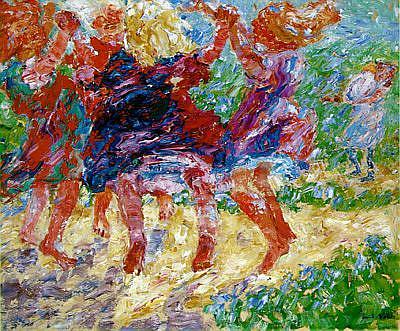
Wildly Dancing Children
Emil Nolde
1909
_______________________
The Best of Times and the Worst of Times
Introduction to the "Hard Times" issue
Michael Zakim
common-place
Defense from the market was such an urgent priority because the system kept crashing, like a "sudden and swift … typhoon," a "whirlwind that wrecked and scattered the earthly fortunes and hopes of thousands," subsequently leaving "the spinal nerve of all the great businesses of the world … paralyzed." That was how things appeared in New York after the "sorry year" of 1857, as merchants, bankers, brokers, and "all the clerks they could spare for the hour" gathered at "change" every day at noon, not to do business but to pray. Could their supplications redeem the past sins of over-trading? Frankly, their contrition had a distinct air of opportunism about it. Or, as Baudelaire, no friend of the new ruling classes, remarked of such displays of bourgeois rectitude, "for the merchant, even honesty is a financial speculation." And, indeed, the spiritual impoverishment of the propertied classes is the central theme of Dickens's Hard Times (1853), a work dedicated to Thomas Carlyle, England's leading agnostic regarding the new liberal religion of progress. Hard Times presents us with a gallery of industrial-age rogues, including Thomas Gradgrind, a devout disciple of "hard facts" for whom system and statistics were at once means and end, and Josiah Bounderby, the hard-hearted arrivisté who has invested all his personal capital in promoting his own self-made myth. Both were truly indigent, Dickens shows us, in ways that no economist could measure, but which bring to mind Tocqueville's well-known description of Americans as "restless in the midst of abundance," citizens driven by "distress, fear, and regret" in searching out the shortest route to prosperity and, once finding it, continuing to search. Speculative mania thus proves to be a personal as much as a social condition, and so panic and depression became psychological and not just economic categories for modern times.
But isn't "acquisitiveness" a part of our very nature, Max Weber famously asked, and proceeded to answer in the affirmative. "It is and has been found among waiters, doctors, coachmen, artists, tarts, venal officials, soldiers, brigands, crusaders, frequenters of gambling dens, [and] beggars … in all ages and in all countries of the world." Greed, Weber went on to argue in convincing fashion, has nothing to do with capitalism. If anything, the opposite might be the case: the industrial economy represented an unprecedented effort to rein in, or at least systematize, this most irrational and impulsive of human traits. But that is precisely what was so radical and subversive about the new market order, for it showed that rationality encouraged chaos. Despite all the images of typhoons, whirlwinds, and paralysis—and, more recently, tsunamis and toxic loans—capitalist crisis is clearly no natural disaster. Panics, crashes, depressions, sell-offs, bankruptcies, and lay-offs are insistently social events and industry's astounding success in liberating humanity from the stinginess of nature only underlines the fact that indigence must also be of industrial origin. Society produces poverty in the same way—and at the same time—that it produces wealth.
And so, "Hard Times" emerge as a form of schizophrenia, diagnostic shorthand for an economy that is always in crisis, and subsequently never in crisis, whose life-granting profits are at once a paralyzing toxin. This is our double life of things, for better and for worse....(more)
Common-place: the Hard Times issue
Vol. 10 · No. 03 · April 2010
_______________________
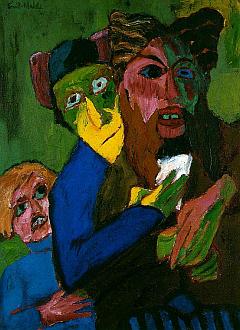
Excited People
Emil Nolde
1913
_______________________
My, this is comforting
Armed Forces Tea Party Patriots
_______________________
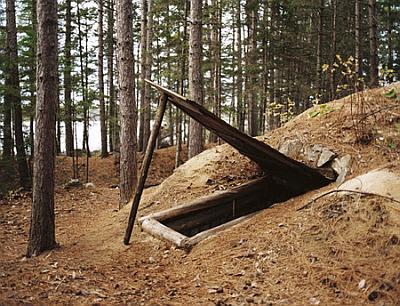
Off the Grid
Keliy Anderson-Staley
via concientious
_______________________
Eleven poems
Tom Clark
jacket
Opus
Tom Clark
Sacrificing to the limiting demands of the opus
is no way to start your day. The opus
itself is like a kind of canvas, with what
has not really been lived through, only idly imagined,
splattered more or less randomly
upon it. The frigging fjords
are no place to build your birdnest of dreams.
The instructions on the brain kit mean zilch.
The dreams are found there in the fjords ab ovo.
The ocean moves deeply in these dreams,
creating dark spots in the encephalogram
into which terror and the desire for beauty swim.
...(more)
_______________________
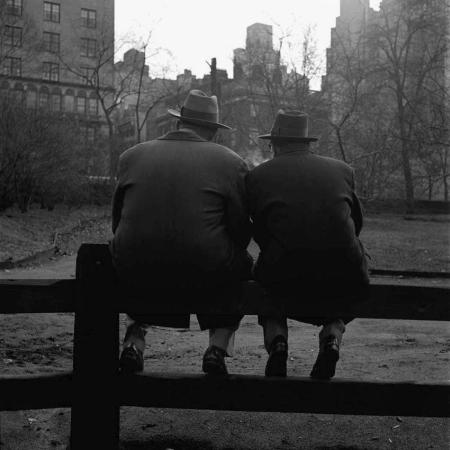
Vivian Maier
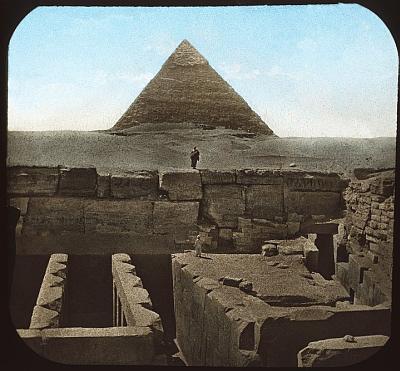 Gizah
old lantern slides from Egypt
The Brooklyn Museum
_______________________
what would I do without this world faceless incurious
where to be lasts but an instant where every instant
spills in the void the ignorance of having been
without this wave where in the end
body and shadow together are engulfed
what would I do without this silence where the murmurs die
the pantings the frenzies towards succour towards love
without this sky that soars
above its ballast dust
what would I do what I did yesterday and the day before
peering out of my deadlight looking for another
wandering like me eddying far from all the living
in a convulsive space
among the voices voiceless that throng my hiddenness
- Samuel Beckett, Translated by Beckett
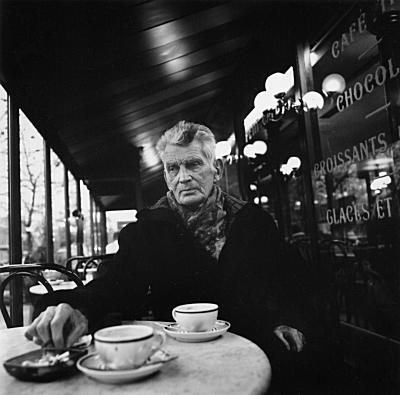
Samuel Beckett
b. 13 April 13, 1906
photo by John Minihan
Café de Paris, December 1985
.....................................................
If only I could make an effort, an effort of attention, to try and discover what's happening, what's happening to me, what then, I don't know, I've forgotten my apodosis, but I can't, I don't hear any more, I'm sleeping, they call that sleeping, there they are again, we'll have to start killing them again, I hear this horrible noise, coming back takes time, I don't know where from, I was nearly there, I was nearly sleeping, I call that sleeping, there is no one but me, there was never anyone but me, here I mean, elsewhere is another matter, I was never elsewhere, here is my only elsewhere, it's I who do this thing and I who suffer it, it's not possible otherwise, it's not possible so, it's not my fault, all I can say is that it's not my fault, it's not anyone's fault, since there isn't anyone it can't be anyone's fault, since there isn't anyone but me it can't be mine, sometimes you'd think I was reasoning, I've no objection, they must have taught me reasoning too, they must have begun teaching me, before they deserted me, I don't remember that period, but it must have marked me, I don't remember having been deserted, perhaps I received a shock.
Samuel Beckett: from The Unnamable (translated from the French by the author, 1959)
courtesy of Tom Clark
_______________________
Crediting Poetry
Seamus Heaney
The Nobel Prize in Literature 1995
As writers and readers, as sinners and citizens, our realism and our aesthetic sense make us wary of crediting the positive note. The very gunfire braces us and the atrocious confers a worth upon the effort which it calls forth to confront it. We are rightly in awe of the torsions in the poetry of Paul Celan and rightly enamoured of the suspiring voice in Samuel Beckett because these are evidence that art can rise to the occasion and somehow be the corollary of Celan's stricken destiny as Holocaust survivor and Beckett's demure heroism as a member of the French Resistance. Likewise, we are rightly suspicious of that which gives too much consolation in these circumstances; the very extremity of our late twentieth century knowledge puts much of our cultural heritage to an extreme test. Only the very stupid or the very deprived can any longer help knowing that the documents of civilization have been written in blood and tears, blood and tears no less real for being very remote. And when this intellectual predisposition co-exists with the actualities of Ulster and Israel and Bosnia and Rwanda and a host of other wounded spots on the face of the earth, the inclination is not only not to credit human nature with much constructive potential but not to credit anything too positive in the work of art.
Which is why for years I was bowed to the desk like some monk bowed over his prie-dieu, some dutiful contemplative pivoting his understanding in an attempt to bear his portion of the weight of the world, knowing himself incapable of heroic virtue or redemptive effect, but constrained by his obedience to his rule to repeat the effort and the posture. ...(more)
_______________________
Bogland
Seamus Heaney
b. April 13, 1939
for T. P. Flanagan
We have no prairies
To slice a big sun at evening--
Everywhere the eye concedes to
Encrouching horizon,
Is wooed into the cyclops' eye
Of a tarn. Our unfenced country
Is bog that keeps crusting
Between the sights of the sun.
They've taken the skeleton
Of the Great Irish Elk
Out of the peat, set it up
An astounding crate full of air.
Butter sunk under
More than a hundred years
Was recovered salty and white.
The ground itself is kind, black butter
Melting and opening underfoot,
Missing its last definition
By millions of years.
They'll never dig coal here,
Only the waterlogged trunks
Of great firs, soft as pulp.
Our pioneers keep striking
Inwards and downwards,
Every layer they strip
Seems camped on before.
The bogholes might be Atlantic seepage.
The wet centre is bottomless.
_______________________
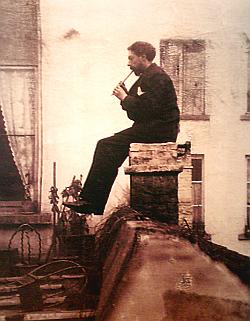
James Ensor
b. April 13, 1860
_______________________
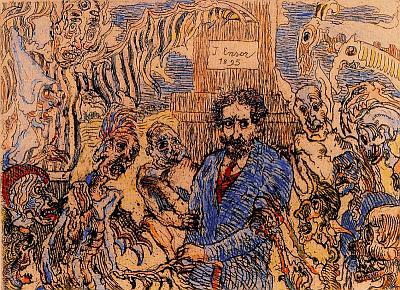
Demons Teasing Me
James Ensor
_______________________
The Photographic Device as a Waiting Machine
Mauricio Lissovsky
Most probably since 1927, and certainly from 1930 onwards, Benjamin uses photography as a theoretical model or, more precisely, as the phenomenical experience that supports his conception of the historical event. Yet what it is that permits photography to play this role remains obscure, even in Benjamin. What makes it possible for the philosopher to recommend the photographer-historian to seek “the inconspicuous spot where in the immediacy of that long-forgotten moment the future nests so eloquently that we, looking back, may rediscover it”?
The question I want to address here comes directly from Benjamin`s assertion: when and how does photography become a device in which the future might be nested? I believe the answer lies in the coming of modern photography, something that Benjamin’s generation witnessed, and whose difference, in relationship to classic photography, Bergson did not notice. To answer this question, we need to look at the photographic act no longer as presupposing docility – light rays smoothly printing reflections on a sensitive surface -, but as resistance; no longer as concerned with velocity, but instead delaying such velocity. ...(more)
Image and Narrative 23
Time and Photography
_______________________
Is Photography Over?
Vince Aletti, George Baker, Walead Beshty, Jennifer Blessing, Charlotte Cotton, Philip-Lorca diCorcia, Geoff Dyer, Peter Galassi, Corey Keller, Douglas Nickel, Trevor Paglen, Blake Stimson and Joel Snyder
_______________________
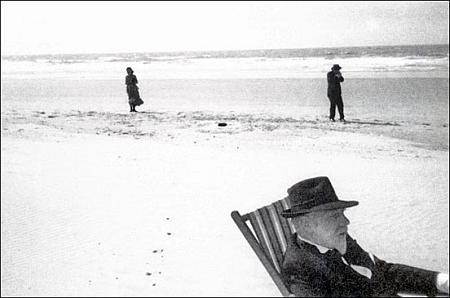
James Ensor in Oostende
ca. 1920
_______________________
fizzle 3
Afar a bird
Ruinstrewn land, he has trodden it all
night long, I gave up, hugging the hedges,
between road and ditch, on the scant grass,
little slow steps, no sound, stopping ever and
again, every ten steps say, little wary steps, to
catch his breath, then listen, ruinstrewn land, I
gave up before birth, it is not possible other-
wise, but birth there had to be, it was he, I was
inside, now he stops again, for the hundredth
time that night say, that gives the distance
one, it's the last, hunched over his stick, I'm
inside, it was he who wailed, he who saw the
light, I didn't wail, I didn't see the light, one on
top of the other the hands weigh on the stick,
the head weighs on the hands, he has caught
his breath, he can listen now, the trunk
horizontal, the legs asprawl, sagging at the
knees, same old coat, the stiffened tails stick
up behind, day dawns, he has only to raise his
eyes, open his eyes, raise his eyes, he merges
in the hedge, afar a bird, a moment past he
grasps and is fled, it was he had a life, I didn't
have a life, a life not worth having, because of
me, it's impossible I should have a mind and I
have one, someone divines me, divines us,
that's what he's come to, come to in the end, I
see him in my mind, there divining us, hands
and head a little heap, the hours pass, he is
still, he seeks a voice for me, it's impossible I
should have a voice and I have none, he'll find
one for me, ill beseeming me, it will meet the
need, his need, but no more of him, that
image, the little heap of hands and head, the
trunk horizontal, the jutting elbows, the eyes
closed and the face rigid listening, the eyes
hidden and the whole face hidden, that image
and no more, never changing, ruinstrewn land,
night recedes, he is fled, I'm inside, he'll do
himself to death, because of me, I'll live it with
him, I'll live his death, the end of his life and
then his death, step by step, in the present,
how he'll go about it, it's impossible I should
know, I'll know, step by step, it's he will die, I
won't die, there will be nothing of him left but
bones, I'll be inside, nothing but a little grit, I'll
be inside, it is not possible otherwise,
ruinstrewn land, he is fled through the hedge,
no more stopping now, he will never say I,
because of me, he won't speak to anyone, no
one will speak to him, he won't speak to
himself, there is nothing left in his head, I'll
feed it all it needs, all it needs to end, to say I
no more, to open its mouth no more, confu-
sion of memory and lament, of loved ones and
impossible youth, clutching the stick in the
middle he stumbles bowed over the fields, a
life of my own I tried, in vain, never any but
his, worth nothing, because of me, he said it
wasn't one, it was, still is, the same, I'm still
inside, the same, I'll put faces in his head,
names, places, churn them all up together, all
he needs to end, phantoms to flee, last phan-
toms to flee and to pursue, he'll confuse his
mother with whores, his father with a road-
man named Balfe, I'll feed him an old curdog,
a mangy old curdog, that he may love again, lose again,
ruinstrewn land, little panic steps
-- Samuel Beckett, translated by the author
_______________________

Thebes
old lantern slides from Egypt
The Brooklyn Museum
via BLDGBLOG
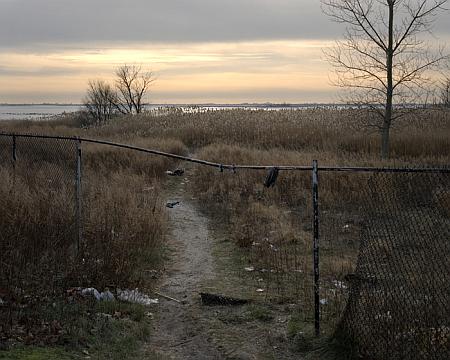
outer lands
Dalton Rooney
third nature logo
a weblog about landscape photography by Dalton Rooney
Dalton Rooney's Long Island, Interior
Fraction Magazine
Issue 13 / April 2010
via Jörg Colberg
_______________________
Vocation
Richard Hoffman
from Gold Star Road
Because I was born into ongoing falsehood,
I have had to learn to think in metaphors,
to lash together what could be found on
each small island of that barren archipelago,
to learn what would float, to find what would
carry me. It is only when I am tired I pity the
various people I have been or, worse, deny them.
I have not met anyone who is entirely who
he thinks he is, nor people anywhere so strange
they did not, somehow, move me. When death comes
I have left instructions for my friends to put me
back in the thesaurus with my ancestors.
Listen to Richard Hoffman read from Gold Star RoadThoughtCast
Richard blogs at Mnemosyne's Memes
_______________________
From the End of History to Nostalgia:
The Manchurian Candidate, Then and Now
Junghyun Hwang
Journal of Transnational American Studies
Transnational American Studies in the Digital Age
Journal of Transnational American Studies
Volume 2, Issue 1, 2010
e-scholarship edition
_______________________
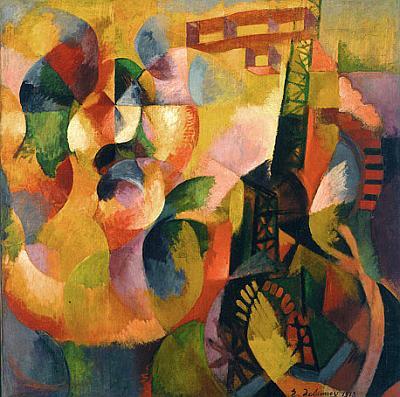
Sun, Tower, Airplane
1913
Robert Delaunay
b. April 12, 1885
_______________________
Five Poems from Mouth of Hell (La boca del infierno)
María Negroni
translated by Michelle Gil-Montero
conjunctions
Fire City geography. 150 yards for a perimeter of hate. Descending circles, circumference nowhere. Infringements and abuses of sufficient reason. Farther off, the wheels of machinations, people grave and trivial, the pomp of regalia out for a little throb of stupor or marvel. Closer, in the range of the arts, by adultery and politics, the mouths of books, open to imperfection.
...(more)
Night journey
María Negroni translated by Anne Twitty google books
_______________________
Negating women is at the heart of the church’s hideous — and criminal — indifference to the welfare of boys and girls in its priests’ care. Lisa Miller writes in Newsweek’s cover story about the danger of continuing to marginalize women in a disgraced church that has Mary at the center of its founding story:
“In the Roman Catholic corporation, the senior executives live and work, as they have for a thousand years, eschewing not just marriage, but intimacy with women ... not to mention any chance to familiarize themselves with the earthy, primal messiness of families and children.” No wonder that, having closed themselves off from women and everything maternal, they treated children as collateral damage, a necessary sacrifice to save face for Mother Church.
-
Maureen Dowd
_______________________

Saint Jerome
Caravaggio
ca.1571-1610
.....................................................
On Bones and Libraries
Colin Dickey
Lapham’s Quarterly
Every librarian, every book collector, finds him or herself between these two mythical places—the Perfect Library of God and the Infinite Library of Babel, the one transcribed by Jerome, the other by Borges. via Charles T. Downey at Ionarts
_______________________
A [S]creed for Digital Fiction
Alice Bell | Astrid Ensslin | Dave Ciccoricco | Hans Rustad | Jess Laccetti and Jessica Pressman
electronic book review
(....)
We sought to sow rhizomes, till topologies, define a field of scholarship that would conduct systematic, fine-grained analyses of literary fiction in a snarl of networked and programmable media.
What better place for our ideas about 'literary machines' to take shape and solidify? What better place to forge a conception of a new literary art emerging from a new materiality? We were there in the crucible city, a city that wears its material history on its coal-stained sleeve, that fired in its own belly the iconic objects of the industrial age.
A manifesto is political; a mission statement is corporate. We deleted these concepts from our discussion. We were not etching a scroll of aesthetic edicts for the digital ages. We were not carving a credo in the sense of monologic truth or certainty, of liberation, of democratization, of salvation, of renewal.
What emerged was a platform of critical principles to guide us in our exploration of digital-literary art, a foundation for any claim to the cultural and literary significance of fiction written on and for a computer screen. What emerged moves through motherboards, cycles through silicone circuits across endless screens and keyboards, roiling through artists' code, readers' clicks, and scholars' listserves... returning, as it does, from the most disembodied forms of electronic machinery to the embodied structures of critical consciousness, or imagination (before setting out again).
What emerged was a creed for the screen. In a word, a [s]creed....(more)
_______________________
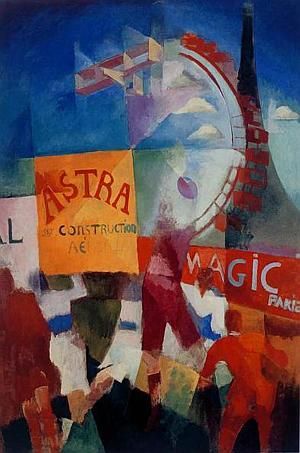
L'Equipe de Cardiff
Robert Delaunay
1913
_______________________
Melancholia
Paul Guest
(....)
It’s true. I have seen it, though
I find myself here without good reason
and no comfortable place to sit.
With errors I’m riddled and machine-gunned
by wrong, leaking half-truth like rain
on a sun-rinsed day, like this day
which leaves no room for melancholia, for black bile,
the true meaning of the word
which I misread and gave myself to
happily, my heart skipping rope like a girl,
and to think I almost rushed here to tell you.
...(morevia riley dog
Featured Poet, Fall 2004: Paul Guest
The Adirondack Review
_______________________
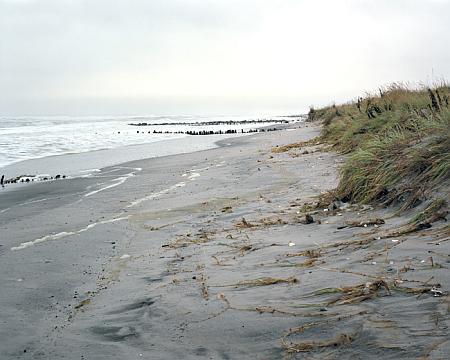
Dalton Rooney
_______________________
The Pleasures and Pains of Coffee
Michelle Legro
Translated from the French by Robert Onopa
Lapham’s Quarterly
(....)Finally, I have discovered a horrible, rather brutal method that I recommend only to men of excessive vigor, men with thick black hair and skin covered with liver spots, men with big square hands and legs shaped like bowling pins. It is a question of using finely pulverized, dense coffee, cold and anhydrous, consumed on an empty stomach. This coffee falls into your stomach, a sack whose velvety interior is lined with tapestries of suckers and papillae. The coffee finds nothing else in the sack, and so it attacks these delicate and voluptuous linings; it acts like a food and demands digestive juices; it wrings and twists the stomach for these juices, appealing as a pythoness appeals to her god; it brutalizes these beautiful stomach linings as a wagon master abuses ponies; the plexus becomes inflamed; sparks shoot all the way up to the brain. From that moment on, everything becomes agitated. Ideas quick-march into motion like battalions of a grand army to its legendary fighting ground, and the battle rages. Memories charge in, bright flags on high; the cavalry of metaphor deploys with a magnificent gallop; the artillery of logic rushes up with clattering wagons and cartridges; on imagination's orders, sharpshooters sight and fire; forms and shapes and characters rear up; the paper is spread with ink—for the nightly labor begins and ends with torrents of this black water, as a battle opens and concludes with black powder.
I recommended this way of drinking coffee to a friend of mine, who absolutely wanted to finish a job promised for the next day: he thought he'd been poisoned and took to his bed, which he guarded like a married man. He was tall, blond, slender and had thinning hair; he apparently had a stomach of papier-mache. There has been, on my part, a failure of observation....(more)
The RoundtableLapham’s Quarterly
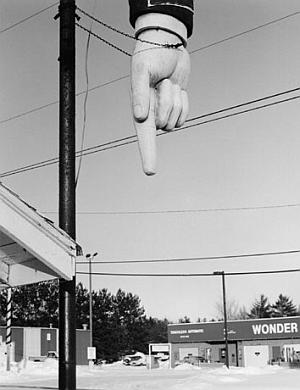
Touchless Automatic Wonder
Lewis Koch
Garageography 3.0.7
Lewis Koch
_______________________
When the gods die
the myths
are lifted off our backs.
Peace be with them.
They were heavy.
- Tom Clark
_______________________
Words like intelligent design, Darwinism, dinosaurs, mutation, fossils, species, random, have conventional meanings to you and I, gentle reader, but to your average ten-commandments-in-courthouses-jesus-loves-AK47s-humans-riding-dinosaurs creationist they have other meanings, and that confusion in language leads to much misunderstanding in the real world. Never fear, I am always available to attempt a translation for you.
-
David Horton
_______________________
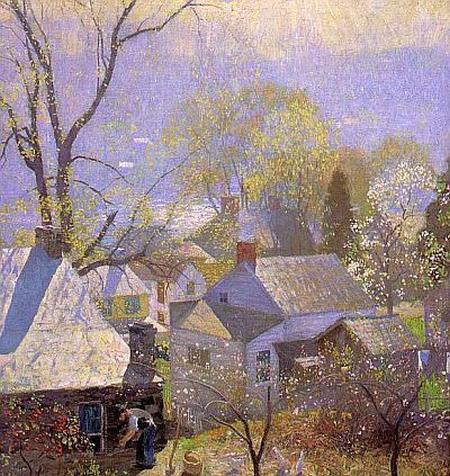
Springtime in the Village
1917
Daniel Garber
b. April 11, 1880
_______________________
Jubilate Agno
Christopher Smart
Christopher Smart wrote a long free-verse manuscript between 1758 and 1763, largely while in a madhouse. 32 pages of this manuscript survive.
HTML edition by Ray Davis
Fragment B, 4
For God has given us a language of monosyllables to prevent our clipping.
For a toad enjoys a finer prospect than another creature to compensate his lack.
Tho' toad I am the object of man's hate.
Yet better am I than a reprobate. who has the worst of prospects.
For there are stones, whose constituent particles are little toads.
For the spiritual musick is as follows.
For there is the thunder-stop, which is the voice of God direct.
For the rest of the stops are by their rhimes.
For the trumpet rhimes are sound bound, soar more and the like.
...(more)

Christopher Smart
(11 April 1722 – 21 May 1771) Christopher Smart: clown of God
Chris Mounsey
google books Christopher Smart and the Enlightenment
Clement Hawes
google books
For I will consider my Cat Jeoffry.
Christopher Smart
(....)
For he is docile and can learn certain things.
For he can set up with gravity which is patience upon approbation.
For he can fetch and carry, which is patience in employment.
For he can jump over a stick which is patience upon proof positive.
For he can spraggle upon waggle at the word of command.
For he can jump from an eminence into his master's bosom.
For he can catch the cork and toss it again.
For he is hated by the hypocrite and miser.
For the former is afraid of detection.
For the latter refuses the charge.
For he camels his back to bear the first notion of business.
For he is good to think on, if a man would express himself neatly.
For he made a great figure in Egypt for his signal services.
For he killed the Ichneumon-rat very pernicious by land.
For his ears are so acute that they sting again.
For from this proceeds the passing quickness of his attention.
For by stroking of him I have found out electricity.
For I perceived God's light about him both wax and fire.
For the Electrical fire is the spiritual substance, which God sends from
heaven to sustain the bodies both of man and beast.
For God has blessed him in the variety of his movements.
For, tho' he cannot fly, he is an excellent clamberer.
For his motions upon the face of the earth are more than any other
quadruped.
For he can tread to all the measures upon the music.
For he can swim for life.
For he can creep....(more)
_______________________
Elective Affinities
cooperative anthology of contemporary u.s. poetry
_______________________
Aether: The Journal of Media Geography
Volume Five A
April 2010
Locative Media and Mediated Localities [pdf]
an introduction to media geography
Tristan Thielmann
via Purse Lip Square Jaw
_______________________
“For the Encouragement of Learning”
John Howkins
The world’s first copyright law was passed by the English Parliament on 10 April 1710 as ‘An Act for the Encouragement of Learning’. The Queen Anne Statute, as it is known, marked the beginning of modern copyright law. Professor Gillian Davies, author of ‘Copyright and the Public Interest’, describes it as ‘the foundation upon which the modern concept of copyright in the Western world was built’, quoting Halsbury’s ‘Laws of England’, edited by Lord Hailsham, as saying, ‘In changing the conceptual nature of copyright, it became the most important single event in copyright history’ and Barbara Ringer, US Registrar of Copyrights, as saying, ‘It is the mother of us all, and a very possessive mother at that.’
The 300th anniversary provides a unique opportunity to review copyright’s purposes and principles. If today we were starting from scratch, but with the same aim of encouraging learning‚ what kind of copyright would we want? ...(more)
Copyright 1710-2010
via Dennis G. Jerz
_______________________
Ginsberg's Celestial Homework
Steve Silberman
Specialized Reading List for "Literary History of the Beat Generation,"
a course taught by Allen Ginsberg at Naropa Institute during the summer of 1977.
_______________________

John Nash
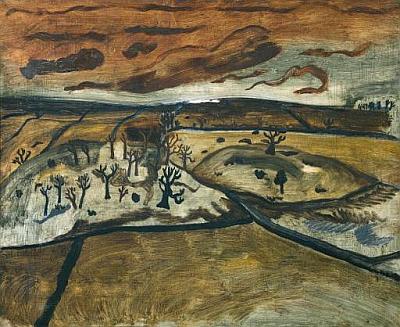
foothills
Cumberland
1928
Ben Nicholson
b. April 10, 1894
_______________________
Zgia
Kein Betreff
RiZoMa
white on paper scribbling a few lines that do not showwhite on paper scribbling a few lines that do not show a blind finger tip might be able to follow the incision of mind into the flat surface of lukewarm snow drink up the words swallow the wicked ways of sense and serendipidy let’s clink our fore heads and kiss that bit of air left between our cups of lips when i look back onto the path i’ve beaten until i coughed up these words i can see a white line as thin as air as random as smoke a tight tether around my neck can feel the pull in my heart but yet written in my own hand white and cloudy on the blue valley of horizon that shingle of day time and again and again and a a blind finger tip might be able to follow the incision of mind into the flat surface of lukewarm snow drink up the words swallow the wicked ways of sense and serendipidy .......(more)
_______________________
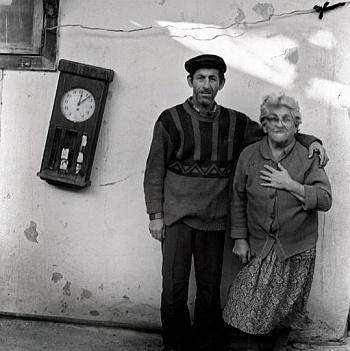
Mother and son
and their crooked clock
Mahalla, Baku, Azerbaijan
Pipe Dreams:
A chronicle of lives along the pipeline
Rena Effendi
Azerbaijan
Visura Magazine, Issue 8
_______________________
Jacques Roubaud interviewed by Marcella Durand
BOMB Magazine
JR I write every night. I never correct, I never go back—I just go on and on. Everything I speak about is, in a way, linked to the old abandoned project. I want to say something about it, but I digress as soon as I start saying something, because I remember something else that I then begin to explain, and so on. So the structure is a bit meandering. I begin The Loop with a very old childhood image of snow in Carcassonne, where snow is very rare. I’m in my room and it’s very cold outside. At night there’s frost on the windowpane—I write and make pictures on it. So that’s the image: there’s an outer and an inner space, memory and the present. That’s the first image of the book, which at the end, returns to it.(....)
JR I tried to recover some very important memories of my childhood. When I found an isolated and condensed memory in my mind, I wrote it down—I discovered very quickly that as soon as I did that, I lost it. I didn’t lose it exactly, but when I tried to find it again, what I found was what I had written. You see, it’s exactly like when you are on the beach and you take a very pretty pebble that’s been in the water and it’s brilliant and then it dries up and there’s a film of salt over it and it’s not beautiful anymore—it’s finished. The gleam of it, the light of it, is gone! As for memories, it’s exactly the same. By working like this I destroy my memory.
MD So were there any memories you didn’t write down because you were afraid that—
JR I wanted to destroy my memory, because of some sadness in it. I’m very different from Mr. Marcel Proust, because he wants to recover the past, but the past cannot be recovered....(more)
_______________________
Alphonso Lingis Essay Collection [pdf]
aaaarg - free reg. req.
Today there are new obstacles to communication. The new information
technology creates denigrating stereotypes, disdain for the past, and contributes to
making territorial or ethnic conflicts genocidal.
New Walls in the Information Age
Alphonso Lingis
Social Identities
Vol. 11, No. 3, May 2005,
Today the very nature of the media sweeps away the past. The instantaneous nature of television reporting holds our eyes gaping upon the future hot before us. Newspapers and magazines keep us breathless in the expectation of new inventions in cancer research, in mineral sciences, in energy production, in genetically altered food crops. The marketing industry excites us for new comfort and safety in personal transportation, new facilities in home cooking and entertainment, new pleasures in furnishing and clothing. As a result we have the sense that what mergers and contracts are being made, what inventions patented in Houston, Silicon Valley, the Ruhr, Lyon, Milan, Tokyo-Osaka, Shanghai, Taipei, Seoul, Mexico City, and Sa˜o Paulo are important, will determine our lives. Societies that are still clinging to the allegedly discredited socialism or welfare state or that are not speeding up the allegedly needed market reforms are dismissed with impatience as backward.
There is another factor; it is that our immediate past forms a black wall that cuts us off from our forefathers and our ancestors. The immediate past of rich countries is the two wars in which they embroiled the whole world. And since then, so many lands where layers of older civilizations persisted slaughtered their populations in the same way. So many millions of people gassed, incinerated, buried in mass graves, disappeared. There are today so many of us who have no idea where or how our parents were disappeared. And so many of us no longer communicate with our fathers and forefathers; we no longer hear what they learned. _______________________
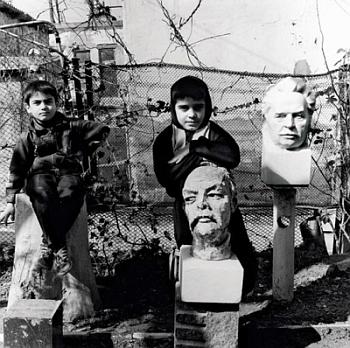
Sculptor's garden
Mahalla, Baku. Azerbaijan
Rena Effendi
_______________________
Neo-Confederate History Month
Ed Kilgore
... as a white southerner old enough to remember the final years of Jim Crow, when every month was Confederate History Month, I have a better idea for McDonnell: Let’s have a Neo-Confederate History Month that draws attention to the endless commemorations of the Lost Cause that have wrought nearly as much damage as the Confederacy itself.
It would be immensely useful for Virginians and southerners generally to spend some time reflecting on the century or so of grinding poverty and cultural isolation that fidelity to the Romance in Gray earned for the entire region, regardless of race. Few Americans from any region know much about the actual history of Reconstruction, capped by the shameful consignment of African Americans to the tender mercies of their former masters, or about the systematic disenfranchisement of black citizens (and in some places, particularly McDonnell’s Virginia, of poor whites) that immediately followed.(....)
Most of all, a Neo-Confederate History Month could remind us of the last great effusion of enthusiasm for Davis and Lee and Jackson and all the other avatars of the Confederacy: the white southern fight to maintain racial segregation in the 1950s and 1960s. That’s when “Dixie” was played as often as the national anthem at most white high school football games in the South; when Confederate regalia were attached to state flags across the region; and when the vast constitutional and political edifice of pre-secession agitprop was brought back to life in the last-ditch effort to make the Second Reconstruction fail like the first....(more)
.....................................................
The GOP is, effectively, the party of willfully unlettered Utopians. It is the party of choice for those who believe global warming is a hoax, that humans roamed the earth with dinosaurs, and that homosexuals should work harder at not being gay.
That the party of unadulterated quackery also believes that Birth Of A Nation is more true to the Civil War than Battle Cry Of Freedom, is to be expected. Ignorance does not respect boundaries. It is, at times, qualified and those who know more, often struggle to say more. But people who believe that the Census is actually a covert attempt to put Americans in concentration camps, are also likely to believe that slavery was incidental to the Civil War.
This is who they are--the proud and ignorant. If you believe that if we still had segregation we wouldn't "have had all these problems," this is the movement for you. If you believe that your president is a Muslim sleeper agent, this is the movement for you. If you honor a flag raised explicitly to destroy this country then this is the movement for you. If you flirt with secession, even now, then this movement is for you. If you are a "Real American" with no demonstrable interest in "Real America" then, by God, this movement of alchemists and creationists, of anti-science and hair tonic, is for you.
-
Ta-Nehisi Coates
_______________________

photo - mw
_______________________
Poet and Anti-Poet
Daisy Fried reviews Charles Bernstein's All the Whiskey in Heaven
With “All the Whiskey in Heaven,” his first book not published by a university or independent press, Bernstein takes his place in the mainstream of American poetry, the very “Official Verse Culture” he’s attacked entertainingly for years — a fate awaiting all our best outsiders. Bernstein is identified with the Language poets, who emerged in the 1970s. Interested in the materiality of language, they are politically left, theoretically grounded and deeply suspicious of the lyric “I” that speaks from the heart in traditional poems without examining its own existence in a sociopolitical power structure. Their work is often most subversive when both joining and satirizing that weary old, dreary old genre, poetry about poetry. Early Bernstein can be opaque, annoying those who see difficulty as elitist and who want poetry to be cuddly and educational. But everyone should love the later Bernstein, a writer who is accessible, enormously witty, often joyful — and even more evilly subversive. ...(more)
_______________________
Despite the immense costs for healthcare systems, the fear of depression, dementia and attention deficit disorder legitimises the boom in neuro-psychotropic drugs. In a performance-driven society that confronts the self with its own shortcomings, neuroscience serves an expanding market.
NeurocapitalismEwa Hess, Hennric Jokeit eurozine
The lifting of temporal and geographical constraints on communication nurtures the illusion of unlimited accessibility and mobility. Just as the libertarian phase of capitalism offered ways for the individual to optimise his or her external appearance and status, so the imperative of the future will be to optimise cognitive and emotional resources as well. The availability of an unlimited supply of effective neuro-enhancers, the opportunity to exchange experiences of using them with others via the Internet, and the utilitarian approach to ethics taken by many individuals, are all preparing the ground for the market success of substances that today are still being experimented with in the laboratory.
The psychologically relevant question of how the self will relate to a mood-enhanced, more capable version of itself is rendered irrelevant by the fact that the requirements of the new capitalist reality make an individual improvement of this kind appear a highly desirable option. Indeed, as a consumer and commodity value appropriate to capitalism, it has already been in currency for some time. Alongside globalisation – the capitalist rationalisation of space and time – we are witnessing the epistemic and technical rationalisation of the neuronal foundations of the self, or what Walker Percy called the abstraction of the self from itself. ...(more)
_______________________
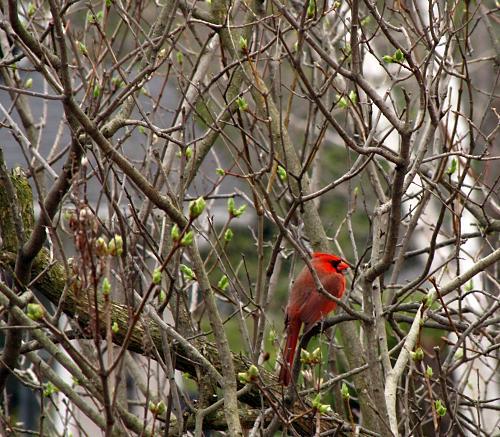
photo - mw
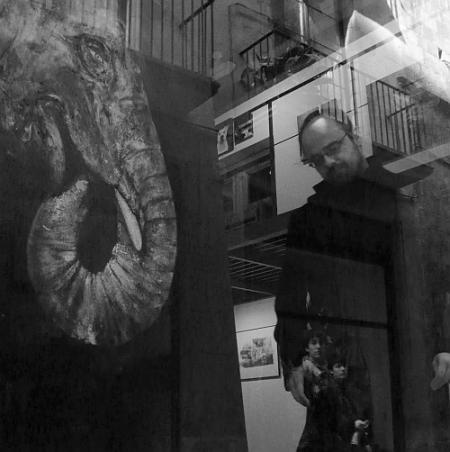
Galería Montcada
Barcelona
Agustina Luengo
_______________________
Deleuze and Ricoeur: Disavowed Affinities and the Narrative Self
Declan Sheerin
aaaarg - free reg.req.
from the Preface
My intention in the work ahead is to place the narrative self in question. To do so is to situate it within a fundamental assumption: like any philosophical or psychological construction, it is a solution to a problem. This assumption inevitably invites the following question - 'To what problem are you the solution?' This question of course spawns a multitude of other questions, somewhat like the multiplying brooms of the sorcerer's apprentice. Soon we find the self confronted by demands from without and within - that it deliver answers, that it bear witness to itself- that it testify. Yet perhaps in its attempts to provide such testimony under cross-examination it must be accorded a privilege unheard of in our courts. It must be allowed to shed identity in the provision of its truth, to drop its capitalization and unhinge itself of the attestation of the utterer as soon as it delivers its testimony. Yes, that statement came from here a moment ago but it did not come from me - I changed the moment you asked me the question/ This is the self in question to which I devote this book - the self in lowercase.
For many years I have worked with children and their families as a psychiatrist and psychotherapist. Before that however, I worked in the psychiatry of adulthood where the core disorder upon which the chronic hospital wards were established was schizophrenia. It was 'first philosophy* in psychiatry. Beneath its multifarious and often alarming presentations a central feature was though to inhere - a disturbance of the sense of self. Somehow, the self of the schizophrenic had become fragmented, porous and permeable to the selves of others, its secret thoughts available to the mind-reading abilities of the neighbours and its bony vault a useless barrier to the infestation of other people's thoughts. Indeed, the antipsychotic medications used in those days were rather scurrilously referred to as 'ego-glue* by some practitioners, insofar as they stuck the self together again or built up the boundary between oneself and another. Nowadays we are less vulgar with our terminology, but the self remains a critical venture for psychiatrists, psychologists and psychotherapists.
_______________________
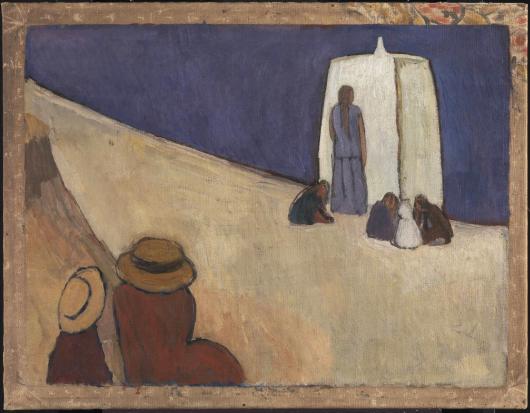
Studland Beach
circa 1912
Vanessa Bell
d. April 7, 1961
_______________________
The Market Colonization of Intellectuals
Lewis R. Gordon
truthout
This academic managerial class consists of a mixture of academics, accountants, lawyers and business people (often serving on boards of trustees and on different levels of administrating universities). They are generally without goals short of imitation. Thus, their avowed purpose is to align the university with the sociology and norms of the market. This alignment brings along an accompanying rationality with market-driven social practices. The hegemony of those practices, which also assert themselves as the bases of intellectual and professional legitimacy, is a form of colonizing rationality. Since it has an impact on how academics behave and aims to determine what and how academics think and what they produce, I call it the market colonization of the academy. Its correlate is the market colonization of knowledge....(more)
via Jodi Dean
_______________________
Believe It or Not (2010 Imperial Edition)
Tom Engelhardt
The Ripley-esque numbers, however, tell a somewhat different story. If war were really a Believe It or Not matter, or victory lay in the number of hamburgers transported or the price of fuel consumed, the U.S. military would have been the winner long ago. After all, it may be the most product-profligate military with the heaviest "footprint" in history. Though it's seldom thought strange (and rarely commented upon in the U.S.), the Pentagon practices war as a form of mass consumption and so, not surprisingly, bears a striking resemblance to the society it comes from. Like the Taliban, it carries its way of life to war on its back. ...(more)
_______________________
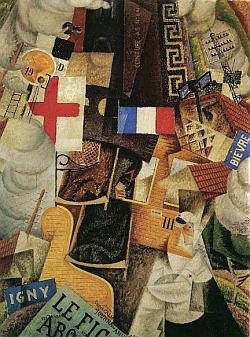
the hospital train
1915
Gino Severini
b. April 7, 1883
_______________________
The only thing that's rare about the Apache helicopter killings is that we know about it and are seeing what happened on video. And we're seeing it on video not because it's rare, but because it just so happened (a) to result in the deaths of two Reuters employees, and thus received more attention than the thousands of other similar incidents where nameless Iraqi civilians are killed, and (b) to end up in the hands of WikiLeaks, which then published it. But what is shown is completely common. That includes not only the initial killing of a group of men, the vast majority of whom are clearly unarmed, but also the plainly unjustified killing of a group of unarmed men (with their children) carrying away an unarmed, seriously wounded man to safety -- as though there's something nefarious about human beings in an urban area trying to take an unarmed, wounded photographer to a hospital.
A major reason there are hundreds of thousands of dead innocent civilians in Iraq, and thousands more in Afghanistan, is because this is what we do.
-
Glenn Greenwald
_______________________
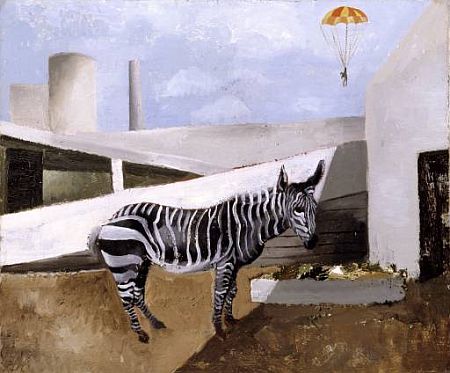
Zebra and Parachute
John Christopher Wood
1930
_______________________
Still not free
Why post-'89 history must go beyond self-diagnosis
Martin M. Simecka
eurozine
... throughout the 1990s, we did our best to build capitalism, failing to see that capitalism was gradually being emptied of its sense of fairness and responsibility. We thought that what we were seeing was perfectly normal and had always been that way. That is why we put up with the daylight robbery that passed for privatization, believing it to be an integral part of western capitalism. Even today, when many in the West believe that "the invisible hand" has withered into a crippled stump, we refuse to acknowledge that our idea of capitalism was wrong and that we had simply experienced one particular version of it – one that is on its last legs.
All of this concerns us more than we are ready to admit. The current global crisis is no longer merely about how many billions should be pumped into the economy so that we can go back to accumulating wealth; it is increasingly about the societal processes that will have a far greater impact on the world than the fall of communism. To my mind, this is something very few people in the post-communist world are prepared to acknowledge. It seems to me that we still differ from the West in the delay and reluctance with which we reflect on our own blindness. This applies both to our perception of the past twenty years of building capitalism, as well as to our perception of communism. (....)
It seems to me that the past twenty years of debate all point to one thing: that we are still not free. All of us who lived at least part of our adult lives under communism have been marked by the past to the extent that we may never be able to discuss it in the language of a natural, free world. We may be able to distinguish between the courageous from the cowardly and victims from culprits, but not between those who are free and those who are not. The category of a free human being simply did not exist under the communist regime. Defiance, resistance or attempts to live a parallel life outside the system may have represented signs of longing for freedom but they did not represent freedom itself. This is why we can and we should bear witness and many deserve admiration and respect for their courage. Yet this does not entitle us to claim that we can interpret this part of history in a free and unbiased way. We are all like patients who self-diagnose and prescribe their own treatment....(more)
_______________________

Boat in Harbour
Brittany
1929
John Christopher Wood
b. April 7, 1901
_______________________
What poetry is most about, it seems to me, is the sheer awe at simply being alive and being conscious of that, of feeling the texture of one's own experience of the world. That's just about the only thing I care to read "about." Call it a phenomenological sense of things. For some, it can be simply being alive, for others, it is a mystic or quasi-mystic state that only occurs once in a while. I get it strongly in Creeley, in Koch, in Rodríguez, in Gerbasi.
Poetry cannot just talk about this marvel of being consciously alive discursively; it has to actually embody that experience in the density of its language. It is not talking about ecstatic experience as a theme that interests me. In fact, what I like oftentimes is poetry that does not seem to be talking about this at all.
Posted by Jonathan
- Jonathan Mayhew
¡Bemsha SWING!
_______________________
Philosophy of Photography
Volume 1 / Issue 1
Philosophizing photography/ photographing philosophy
In summer 2009 the editors invited a number of prominent thinkers known for their writing about photography to contribute a short text to this symposium on the present conjunction of photography and philosophy. The resulting collection of eight essays inaugurates this journal and provides a tentative agenda for future contributions by outlining a range of themes, processes, methodologies and digressions that might be explored in greater depth, and from different perspectives, in future issues of the journal.
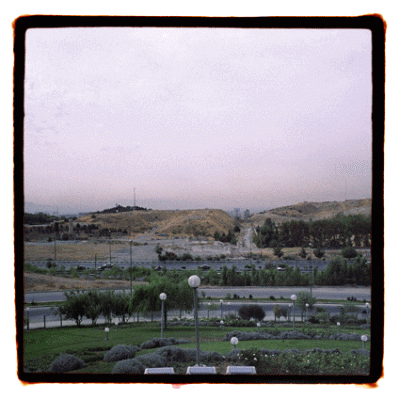
Hakim Abol Qassem Hassan
pour Ali Tusi
known as Ferdowsi
11th Century Poet
Where the Heads of the Renowned Rest
Mohammad Ghazali
Dide Photography Magazine
Farsi and English
first issue
"a look at our city from the point of view of public statues installed in various points of our city(....)
We remember their sentences and verses and murmur them and
they have become our chants high atop our rules of life.
Imagining a moment in their place, even if unreal and impossible,
even if unpleasment due to what they are condemned to see for an eternity
has always been and is a pleasant thought and dream.
The series of photographs, Where the Heads of the Renowned Rest,
is the act or experience of placing myself instead of another I;
even for a minute,
even for a moment,
looking at the current world around us through the eyes of statues which are themselves built today by our hands!”
via Mrs. Deane
_______________________
Provisional Language
Kenneth Goldsmith
harriet
Language has become a provisional space, temporary and debased, mere material to be shoveled, reshaped, hoarded and molded into whatever form is convenient, only to be discarded just as quickly. Because words today are cheap and infinitely produced, they are detritus, signifying little, meaning less. Disorientation by replication, mirroring, and spam is the norm. Any notion of the authentic or original is untraceable. French theorists who anticipated the destabilizing of language could never have foreseen the extent that these words refuse to stand still; restlessness is all they know. Words today are bubbles, shape shifters, empty signifiers, floating on the invisibility of the network, that great leveler of language, from which we greedily and indiscriminately siphon, stuffing hard drives only to replace them with bigger and cheaper ones. Digital text is the body-double of print, the ghost in the machine. The ghost has become more useful than the real; if we can’t download it, it doesn’t exist. Words are additive, they pile up endlessly, become undifferentiated, shattered into shards now, words reform into language-constellations later, only to be blown apart once more.
The blizzard of language is amnesia-inducing; these are not words to be remembered. Stasis is the new movement. A simultaneous condition of ubiquitous obsolescence and presence, dynamic yet stable. An ecosystem: recyclable, repurposed, reclaimed. Regurgitation is the new uncreativity; instead of creation, we honor, cherish and embrace manipulation and repurposing. Letters are undifferentiated building blocks — with no one meaning more or less than another; vowels and consonants are reduced to decimal code, temporarily constellating into a word processing document; then a video; then an image; perhaps back to text. Both irregularity and uniqueness are provisionally constructed from identical textual elements. Instead of trying to wrest order from chaos, the picturesque now is wrested from the homogenized, the singular liberated from the standardized. All materialization is conditional: cut, pasted, skimmed, forwarded, spammed....(more)
_______________________
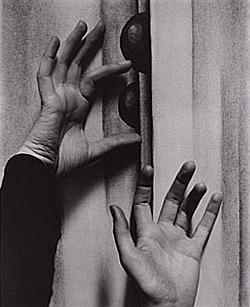
Georgia O'Keeffe
d. March 6, 1986
Georgia O'Keeffe-Hands, circa 1919
Alfred Stieglitz
Georgia O'Keeffe and the Camera: The Art of Identity
_______________________
from
The Exchanges II
Robert Kelly
There is in language a temerament of fear
to answer the animal is to talk about syllables
pure as a lake in Siberia
salty & rush-ridden centuries from the sea
to which a river flows backwards Chrismas night
or gull's hornpipe lowly to the cross in deep snow
when they hanged the first king: whose strangled throat
made consonants
in the forests vowels
invented with the caprice of the unicorn,
goat-eyed red-bottomed mandrills at horizons,
perpetual song of lemurs: ururur, syllables,
Aurora bloody-fisted from the Caspian lake,
erect
the Madman's Vision a vision into
image or into form?
Adam's allergy to the first bite retched into speech?
SET 1 [pdf]
Edited and published by Gerrit Lansing, copyright 1961. Cover by Harry Martin.
Includes:
Robert Duncan, Charles Olson, Stephen Jonas, Edward Dorn, John McGavern, Robert Kelly, John Wieners, Frater Perdurabo, Gerrit Lansing.
.....................................................
SET 2
Edited and published by Gerrit Lansing. Cover by Harry Martin. Copyright 1963.
features LeRoi Jones, Diane Wakoski, Robert Kelly, Kenward Elmslie, John Wieners, Stephen Jonas, Gerrit Lansing.
_______________________

photo - mw
_______________________
the poem is remembering me (PoemTalk #30)
Robert Grenier, as well as returning panelists, Bob Perelman and PennSound co-director Charles Bernstein. On the slate were two poems by William Carlos Williams, chosen by Grenier for the occasion: "The Red Wheelbarrow" and "Flowers by the Sea," both of which were commonly read by Williams. _______________________
Eiríkur Örn Norðdahl interview
3:AM
Modernism in Iceland is more of the TS Eliot variety than it is of the Gertrude Stein variety – let alone Dada or Futurism. There are single examples of sound poetry, visual poetry and experimental writing in Iceland’s history, but they are mostly odd singularities – there’s no avant-garde tradition in Icelandic poetry, and even those poets that have dabbled in the avant-garde have done so ocassionally as “undisciplined youths” and then abandoned it for more mainstream poetic projects. When avant-garde poetry surfaces in Iceland it is mostly understood as novelty-item, joke or attempted artyfartyism – and dismissed posthaste. ...(more)
.....................................................
Fist or words bereft of sense (excerpts)
Eiríkur Örn Norðdahl
3:AM
X.
Turn on the lights, it’s dark
Fears insolvency & fears collection proceedings & fears demands on estate & fears government collectors & fears unsuccessful attachment & fears & fears & fears creditors & fears modern mendicancy & fears to render unto caesar the things which are caesars & fears for instance attachment of property & fears insolvency measures & fears the order of debts & fears the administrator & fears a firesale & fears moratorium & fears mortgaged collateral & fears & fears & fears registered property mortgage deeds & fears the legal status of guarantors & fears debtees & fears fiscal movements & fears over-heating & fears inflation & fears a business deficit & fears & fears & fears a fiscal deficit & fears currency risk & fears pegged exchange rate systems & fears an increase in lending & fears default & fears for instance unemploymance & fears depreciation & fears fit-payments & fears the quarterly settlement & fears loss of expenditure & fears collection & fears payment behaviour & fears & fears & fears the battle about Iceland’s image
Turn off the lights, it’s time for bed
...(more)
Eiríkur Örn Norðdahl's blog
_______________________
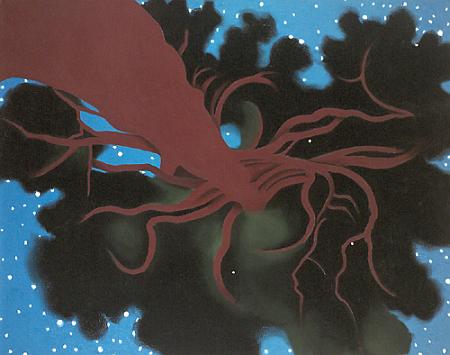
The Lawrence Tree
Georgia O’Keeffe
1929
_______________________
Just folded, like a handkerchief or a hinge.
Anselm Berrigan
harriet
(....)
Dilated pupils follow the local smoke signals, trading the rainbow broke into tears for a deeper well from which to pay the bills. I see your indifference and raise you a practical salute. Isn’t judgment an overly natural phenomenon, a light matter in need of deeper perversion? There is the diner fantasy in which the body next door demands to be taught something. Proof of useful existence turning into a welcome ledge. I’m working through these recalcitrant responsibilities. I get sent some messages meant to protect our mutual mess. I feel like an amputated leg.
I’m skeptical of that place’s relationship to place, it’s projection of other memory. But is the will to force the issue anything more than necessary gambit to pass the time beneath a veneer of confidence? There is no bond of reality between money and enough. I gave up early on the search for the source, having taken halting steps along such recovery as to be depicted with stiffer hips than previous carnations endured. And yet it was not so wracked with difficulty, that disavowal of energies conjured from pictures of plagues. I had some images, their floating contours bred to provoke a system of scanning I’d later mean to acknowledge and lose. That’s taking credit for waking up, and we don’t like that....(more)
_______________________
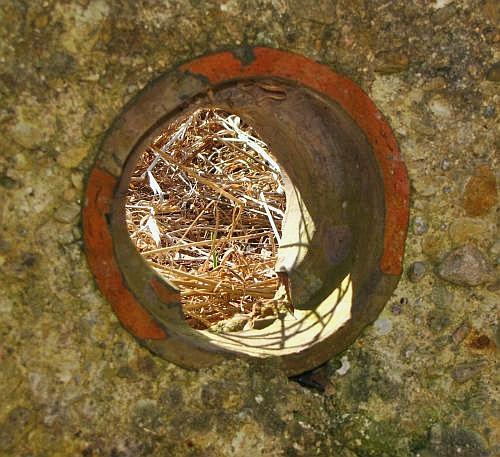 _______________________ _______________________
The Hinge
From The Life and Opinions of Tristram Shandy, Gent. (1759-67) by Laurence Sterne
Chapter xxi
EVERY day for at least ten years to-gether did my father resolve to have it mended, ---- 'tis not mended yet; ----no family but ours would have borne with it an hour, -- and what is most asto-nishing, there was not a subject in the world upon which my father was so elo-quent, as upon that of door-hinges. ----And yet at the same time, he was certain-ly one of the greatest bubbles to them, I think, that history can produce : his rhe-toric and conduct were at perpetual handy-cuffs. ---- Never did the parlour-door open -- but his philosophy or his principles fell a victim to it; ---- three drops of oyl with a feather, and a smart stroke of a hammer, had saved his ho-nour for ever.
Inconsistent soul that man is ! --languishing under wounds, which he has the power to heal ! -- his whole life a con-tradiction to his knowledge! -- his reason, that precious gift of God to him -- (instead of pouring in oyl) serving but to sharpen his sensibilities, ---- to multiply his pains and render him more melancholy and un-easy under them ! -- poor unhappy crea-ture, that he should do so ! ---- are not the necessary causes of misery in this life enow, but he must add voluntary ones to his stock of sorrow ; ---- struggle against evils which cannot be avoided, and sub-mit to others, which a tenth part of the trouble they create him, would remove from his heart for ever ?
By all that is good and virtuous! if there are three drops of oyl to be got, and a hammer to be found within ten miles of of Shandy-Hall, -- the parlour-door hinge shall be mended this reign.
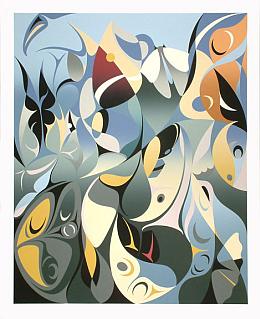
Symphony of Butterflies
Susan Point
(Coast Salish)
Northwest Coast
b. April 5, 1952
1 2 3
_______________________
We Rise on Sun Beams and Fall in the Night
Allen Ginsberg
Dawn's orb orange-raw shining over Palisades
bare crowded branches bush up from marshes--
New Jersey with my father riding automobile
highway to Newark Airport--Empire State's
spire, horned buildingtops, Manhattan
rising as in W.C. Williams' eyes between wire trestles--
trucks sixwheeled steady rolling overpass
beside New York--I am here
tiny under sun rising in vast white sky,
staring thru skeleton new buildings,
with pen in hand awake...
-
December 11, 1974
Selected PoemsAllen Ginsberg
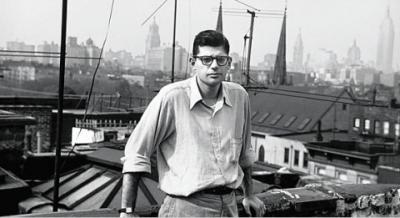
Allen Ginsberg
June 3, 1926 - April 5, 1997
photo by William S. Burroughs, NY, Fall 1953
_______________________
Happiness
Jane Kenyon
(1947 - 1995)
There’s just no accounting for happiness,
or the way it turns up like a prodigal
who comes back to the dust at your feet
having squandered a fortune far away.
And how can you not forgive?
You make a feast in honor of what
was lost, and take from its place the finest
garment, which you saved for an occasion
you could not imagine, and you weep night and day
to know that you were not abandoned,
that happiness saved its most extreme form
for you alone.
No, happiness is the uncle you never
knew about, who flies a single-engine plane
onto the grassy landing strip, hitchhikes
into town, and inquires at every door
until he finds you asleep midafternoon
as you so often are during the unmerciful
hours of your despair.
It comes to the monk in his cell.
It comes to the woman sweeping the street
with a birch broom, to the child
whose mother has passed out from drink.
It comes to the lover, to the dog chewing
a sock, to the pusher, to the basketmaker,
and to the clerk stacking cans of carrots
in the night.
It even comes to the boulder
in the perpetual shade of pine barrens,
to rain falling on the open sea,
to the wineglass, weary of holding wine.
_______________________

Enfant à la cage
1949
Antonio Clavé
b. April 5, 1913

Bonus Bureau, Computing Divison
Washington, D.C.
November 24, 1924
detail
Library of Congress
_______________________
from “the workers’ apocalypse”
Valter Hugo Mãe
Translated from PortuguesePortuguese by Kenneth Krabbenhoft
at night maria da graça dreamed that souvenirs of life on earth were on sale outside the gates of heaven. people held their hands out, brazen voices called out to her as if they were hawking fresh fish, they closed in on her soul and, for a song, sold those things most likely to meet the pressing needs of the dying. the ultimate charlatans, she thought, actually ashamed that she had to go on thinking when she was dead, or maybe it was good, before entering heaven, to be given the chance to take an object with you, a materialized image, a kind of evidence of a past life or of extreme longing. she asked them to let her through, repeated that she was in a hurry. she couldn’t figure out what she was supposed to do, couldn’t make up her mind about anything. she was in a bind, she didn’t want to risk setting herself up in eternity through an act greed. in the understandable fear or anxiety or excitement of so obviously being there for the first time she kept hoping that st peter would explain how it worked so that, with one foot in and the other one still out, she could purchase mozart’s requiem or a print of goya’s frescoes or within a budding grove, in french.
contrary to expectations, the gates of heaven were small. one had to crouch quite low to get through them, and those who wanted attention created a remarkable fuss that ended in violence and clouds of dusts that were kicked up with some frequency. maria da graça has barely escaped the hawkers; now she’s trying to figure out which side of the square was the best route to the gates. it would not be easy to negotiate those hundred meters without getting knocked down, but it would be worse to be taken for one of the troublemakers and made to stay outside, eternally raging....(more)
Words Without BordersApril 2010: PEN World Voices
_______________________
 sugar bush
photo - mw
_______________________
Experiment, for me, is not a formal tic, some avant-garde glaze or fashionista look. It is a processual question of writing some thinking into the page in the medium of language.
A visionary practice of cultural critique
interview with Rachel Blau DuPlessis
...desires to change culture and politics often get mapped onto languages and conventions that already exist. This, sometimes, for the sake of "efficiency" or even "communicability." Like the joke about socialist realism—instead of boy meets girl, it's boy meets tractor. But some structure of feeling remains—"boy meets…" hasn't changed; the romance hasn't changed. Just the object has changed. This kind of syncretism is both powerful and absorptive (like Catholicism assimilating pagan and polytheistic holidays and materials), but it may mean that fundamental structures of genre, language, convention are not destabilized or restructured but just undergo point-for-point substitution. That's why a person can't assume that political radicalism means or implies literary radicalism. They are separable goals. (....)
... my decision to write long poems comes from my desire to encircle the lyric, to transform the female cultural position in Poetry as a whole. The containment of lyric, its attractive smallness, its iconic status seem to help constitute the subordinate cultural position of females. That this is somewhat tendentious and polemical as a position did not make it any less powerful for me. Recently, I have also felt that the structure of epiphany and revelation in lyric poetry has relation to a Christian structure of feeling that has transferred itself to claims about poetic form. I find that, as an alternative, I am invested in a Jewish tradition of textuality that involves continuous commentary and gloss. I say this, by the way, as unredeemedly, proudly secular in my spiritual allegiances.
These situated cultural preferences and ideas do not necessarily control any individual poetic acts and choices, although, in the largest sense, these preferences may motivate my aesthetic/formal acts. Poetry resides in the complex of word meaning, sound, syntax and word order, diction, tone, connotation and nuance. These choices are made deep inside the work as it is being created in order to make rich arcs of feeling, knowledge, and understanding in the poetic text. I want to create a density and resonance of cultural texture in my work. Thus I have a horror of narrowly politically motivated poetry—for myself. Or to say this differently—I do not write poetry wrapping up in a tidy package those opinions that I think it would be good for people to have, nor do I write poetry presenting those useful, correct, or pertinent positions to the reader. I might be describing this in a limited fashion, as a narrow version of what a political poem is, but I want to make a particular point. People have written these kinds of poems. But I tend to suspect this desire for myself.
However, I feel that politics and the private life of persons; politics and emotional understanding; the historical world and the private sphere are not binaries. I feel, as Adorno said, "migrated into" by our current realities, infused in every cell by an on-going world crisis of global plunder and nationalist malfeasance. The political world, in another way, infuses everything we are. I express it continuously; I do not have to "decide" to write a "political" poem—I write politically simply by trying to represent all the dimensions of my and our lives. The social world, the economic world, the political world are here, now. The questions is how to face them, how not to "exclude" their force by means of the purificatory, aestheticizing rituals of art. As my answers above have also indicated, I would also say that I do not write "feminist poetry" as that term has been understood, as coming directly out of the opinions or positions of the women's movement. I am a feminist and a poet, not a feminist poet. I write enriched by and motivated from feminism and its cultural critique. I do not "write" feminism within my poetry in any straightforward, easily identifiable way. It's not opinions, simply, it is a cultural relationship. For me feminism is a critical and resistant relationship to much of hegemonic culture, to its products and to its ideologies. This critical resistance and suspicion is seen in a good deal of my work. But when I write poetry, all of myself is at play (and at work) and/or none of myself is; I pass beyond "self" into "language" and "poesis" and "the world." My poetry is, in general, not affirmative (in the sense of declarative, inspirational, rousing, manifesto-like) but, in the strictest sense, I work from a poetics of negativity. I make the analytic, the speculative, the oppositional, the intricate, the thing that refuses to be consoled....(more)
_______________________
Anthology of Russian Minimalist and Miniature Poems
Part I, The Silver Age
Translations by Alex Cigale
The measured sound of wheels,
The field, the row of birches,
And many muddled feelings;
race past, race past, race past.
The measured noise and hum,
The sky’s impending horizon,
And many muddled thoughts;
Further! Farther! Distant!
April 12, 1896
Valery Bryusov (1873-1924)
_______________________

A Peaceable Kingdom
with Quakers Bearing Banners
(1829-30)
Edward Hicks
(April 4, 1780-August 23, 1849)
_______________________
Transitzone/
An interview with poet Pierre Joris
If Gertrude Stein is ‘the mother of us all’ then Ezra Pound is our father. A strange couple, for sure, but essential to anyone coming into poetry in the second half of the 20th century with the intention to do more than write the traditional neo-romantic lyric. For me, Pound was there first – or rather right after I had found the Beat writers, Kaufman, Ginsberg, Kerouac and Burroughs. His importance was immediately immense, and at least twofold. Starting to read the Cantos I realized that poetry was a life’s work of total dedication, not something one could do on rainy weekends when moved by the spirit. Pound also immediately made clear that a learned poetry, a poetry that includes not only history, but also various sets of knowledges, was not necessarily a boring ‘academic’ poetry. The range of his work was liberating. Everything from everywhere could enter the field of writing, to be energized into that multifaceted, multilayered construct called a poem. Amazing!
There was a further essential dimension of Pound’s undertaking that fascinated me and that appealed directly to my concerns: translation. Not just translation as a useful, enriching transfer of other poetries into a given language – though, obviously, I have practiced that craft for onto 40 years now – but also translation as an essential part of writing itself. Translation is writing, and all writing is always already, as they used to say, a translation (into language). In that sense I was immediately struck by the masterfulness of Canto I, which is an original poem (whatever that may or may not mean), but also, a double translation of a Greek text via Latin into English and, formally speaking, into an adapted Anglo-Saxon form, which, on its turn, is thoroughly modern....(more)
_______________________
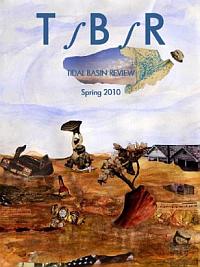
Tidal Basin Review
Inaugural Spring 2010 Issue the basin blog
_______________________
Treatment
Ange Mlinko
new yorker
It’s a little spa for the mind—seeing butterflies
set themselves down by the dozen like easels
on bromeliads, when out on the street the boutiques
are dilapidated, construction can’t be told from ruin.
A single taste bud magnified resembles an orchid
but what that one’s drinking from is a woman’s eye
which must be brineless. I wonder what she consumes
that her tears taste like fructose. For minutes she’s all its.
Then the moon rises and the river flows backward.
Composed of millions of tiny north poles, iron’s
punched out of the environment, hammered into railways.
Pubs serve shepherd’s pies with marcelled mashed-potato crusts
and each tree casts its shade in the form of its summary leaf.
Is a woman’s eye a single taste bud magnified?
Yet construction can’t be told from ruin.
Out on the street the boutiques are dilapidated
by the dozen like easels. And the mind—it’s a little spa.
_______________________
 Marguerite Duras
(4 April 1914 – 3 March 1996)
Hiroshima mon amour
Practicalities
Marguerite Duras: apocalyptic desires
Leslie Hill
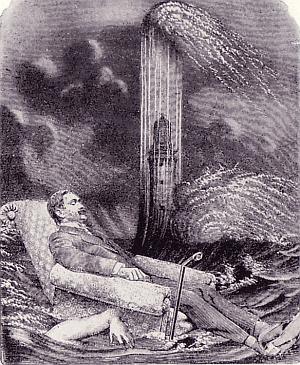
Spiritual repose
La Femme 100 Têtes
collage-novel
1929
Max Ernst large scans from the sorely missed Giornale Nuovo
1 2 3 4
_______________________
Archaeologies of Media Art
Jussi Parikka in conversation with Garnet Hertz
CTheory
Jussi Parikka: Media archaeology... ambiguous? Indeed. I was just reminded by an archaeologist at Cambridge that there is a sub-discipline in archaeology called "media archaeology." Such contexts do not always spring to mind when we consider media archaeology from a more theoretical perspective. For us in media studies and media arts it is quite often the footnotes of Foucault, Kittler, and the dead media of Bruce Sterling that provides the context for the media archaeological way of doing analysis. Media archaeology exists somewhere between materialist media theories and the insistence on the value of the obsolete and forgotten through new cultural histories that have emerged since the 1980s. I see media archaeology as a theoretically refined analysis of the historical layers of media in their singularity -- a conceptual and practical exercise in carving out the aesthetic, cultural, and political singularities of media. And it's much more than paying theoretical attention to the intensive relations between new and old media mediated through concrete and conceptual archives; increasingly, media archaeology is a method for doing media design and art. ...(more)
_______________________
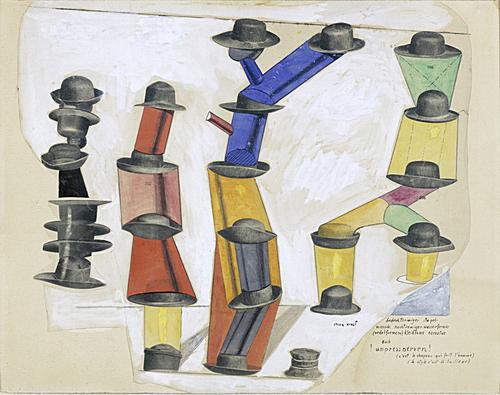
The Hat Makes the Man
Max Ernst
1920
_______________________
Words
Barbara Guest
(1920 - 2006)
The simple contact with a wooden spoon and the word
recovered itself, began to spread as grass, forced
as it lay sprawling to consider the monument where
patience looked at grief, where warfare ceased
eyes curled outside themes to search the paper
now gleaming and potent, wise and resilient, word
entered its continent eager to find another as
capable as a thorn. The nearest possession would
house them both, they being then two might glide
into this house and presently create a rather larger
mansion filled with spoons and condiments, gracious
as a newly laid table where related objects might gather
to enjoy the interplay of gravity upon facetious hints,
the chocolate dish presuming an endowment, the ladle
of galactic rhythm primed as a relish dish, curved
knives, finger bowls, morsel carriages words might
choose and savor before swallowing so much was the
sumptuousness and substance of a rented house where words
placed dressing gowns as rosemary entered their scent
percipient as elder branches in the night where words
gathered, warped, then straightened, marking new wands.
_______________________
Musicality in Poetry
Camille Martin
Rogue Embryo
The distinction that Herzog makes between the aesthetic and the logical in musical content isn't clear, since music's "tonally moving forms" can possess their own kind of logical interplay. However, what I find most interesting about Herzog's fleshing out of Pater's aphoristic championing of music is the movement, in the concern with musicality in poetry, away from mimetic concerns to language's drawing attention to itself as a medium: words as musical motifs or brushstrokes. The musical analogy, to my mind, offers more complex possibilities than painting (but this could be simply because music was my first discipline): just as a motif can be varied (inverted, embellished, rhythmically augmented, and so forth), so can a word be varied by context, connotations, and so forth.
Barbara Guest’s MusicalitiesCamille Martin _______________________
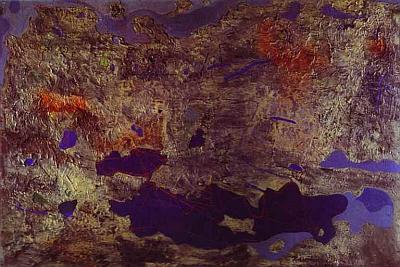
Europe after the Rain
Max Ernst
1933
_______________________
To Remember Spain:
The Anarchist and Syndicalist Revolution of 1936
Murray Bookchin
aaaarg - free reg. req.
from the Preface:
These essays are less an analysis of the Spanish Revolution and Civil War of 1936-39 than an evocation of the greatest proletarian and peasant revolution to occur over the past two centuries. Although they contain a general overview and evaluation of the Anarchist and Anarchosyndicalist movements (the two should be clearly distinguished) in the three-year struggle at the end of the 1930s, they are not intended to be a full account of those complex events.(....)
The endeavors of the Anarchists and their Left Socialist allies in the Spanish Revolution must never be forgotten, lest today's Left lose a sense of continuity with the revolutionary era -- its idealism, principles, and ideas. The loss of this continuity would contribute to political opportunism and to a fashionable ideological pluralism that mingles reformist politics with radical rhetoric as the need arises. _______________________
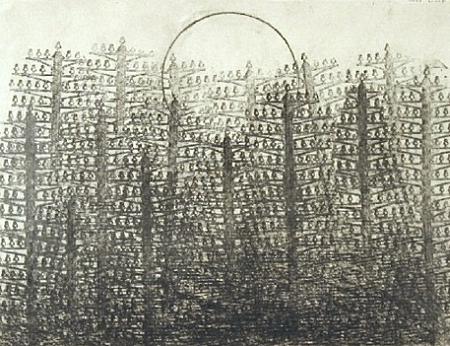
The Forest
1927-28
Max Ernst
(2 April 1891 – 1 April 1976)
_______________________
Cowboy Poetry Matters
Anselm Hollo & Laura Wright
(....)
when falling down a mountain
don't put out hands
to stop the fall
and never try putting a leash on a sphinx
or sphynx as poet Heliczer spelt it
"poetry to the rescue!"
elevators
are very serious
and so was Napoleon in his little jacket
while the Austrians were thinking only of the frontier
poetry could be considered
an alternate
fuel
so don't hop in the car
but hop in the book !
walk around in it and
take a look !
then take another
your plea is reasonable
but we cannot provide
each thing can only
fit, like Chief Niwot, frozen
in its little box
a foursquare sculpture in a park
meant to symbolize grief and regret
but now simply sad
old toy
in the attic
its eyes close when it is bored with its job
going around in circles
while down the street
a body rests on dry ice
in its little jacket as the Riders
of the Purple Sage file past
the power station
gleaming on the moon
O FROG PLOP POND
Funny Business
A Special Edition of The East Village
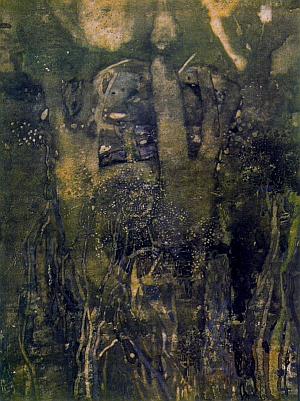
At the Edge of the Wood
Charles Rennie Mackintosh
1868-1928
_______________________
Poem Beside Itself
Graham Foust
Where in the capsized animal
am I. Came to to find me
having at a padlock with
a hammer. You there. There in
the ash there. Screwed to the past
like a kiss. You've never had
to kill me. You have nowhere
but the air. The birds are so
clearly not birds, but they've been
everywhere. Their eyes were here,
always. And time. Cut to ground.
Cue tremors. Cue the mammals
and vowels. Cue the landscape
brandishing itself with lazy malice.
Cue a usual night with planets
burning out at one another.
Cue toys in their aisles—I said
cue tremors!—and queer
every relevant dream.
...(more)
Gramaphoons: On Graham Foust
Ange Mlinko
Cars. Rain. Alcohol. Insomnia. Money. Wind. TV. Sky. Super Target. Bones. Birds. Honky-tonk. The night. A list like this evokes vast tracts of middle America, whose most abiding cultural expression may be the country song. Country is a pure product of both the recording industry and folk music traditions dating back centuries; it typically mines the quotidian and refines it into an elegy you've been hearing on the radio all your life. Things of unutterable dreariness--strip malls and interstates but also drinking problems, marital problems--turn mournfully sweet. Its roots in America's dream life are chronicled in Greil Marcus's Invisible Republic (reissued as The Old, Weird America), which tells the story of how the earliest recordings of "race" and "hillbilly" music (which became blues and country, respectively), gathered and released by Harry Smith in 1952 on Anthology of American Folk Music, ignited the 1960s folk music revival and revolutionized rock music. The story has mythic dimensions, but Marcus also gives it a civic cast: this is music as "democratic speech."
Graham Foust was born in Knoxville, Tennessee, raised in Eau Claire, Wisconsin, and has lived as an adult in western New York, Iowa and Oakland. His poetry partakes of this collective American imaginary and its terse vernacular style: (....)
A Mouth in California is Foust's fourth book in seven years. His first two books, As in Every Deafness and Leave the Room to Itself, featured poems (like "Night Train") that were formally so austere and so preoccupied with pain that they risked numbing the reader. (Or this reader, at least. For me, absence of a range of feeling in a book of poems seems more studied, not less.) Foust's austerity made him hard to place aesthetically: he had studied at SUNY Buffalo, a haven in the 1980s and '90s for poets enticed by the poststructural Language school, and his minimalism would have seemed at home there. But there was no radical indeterminacy in the work--his wrenched syntax was constrained by, and put in the service of, an afflicted soul that seemed apprenticed to the poems of Louise Glück more than those of Charles Bernstein. In his third book, Necessary Stranger (2007), Foust started winking at his own earnestness: for one thing, the volume opened with the trio of poems "1984," "Jump" and "Panama"--all titles of Van Halen hits from the band's heyday. The wit was a relief from the pressure of his condensery. ...(more)
Graham Foust’s A Mouth in CaliforniaJohn Latta
Graham Foust poems 1 2 3
and books
_______________________
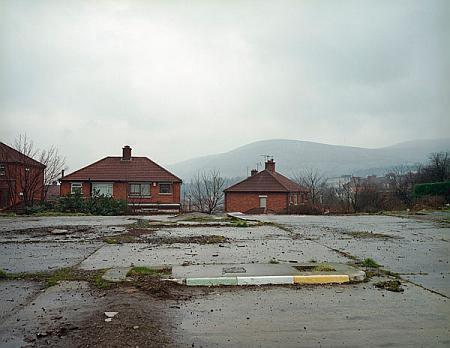
troubled land
Paul Graham
.....................................................
The Unreasonable Apple
Paul Graham
This month I read a review in a leading US Art Magazine of a Jeff Wall survey book, praising how he had distinguished himself from previous art photography by:
“Carefully constructing his pictures as provocative often open ended vignettes, instead of just snapping his surroundings”
Anyone who cares about photography ‘s unique and astonishing qualities as a medium should be insulted by such remarks, especially here, now, in 2010, in this country, in this city, which has embraced photography like no other.
Now this is maybe just an unthinking review, but what it does illustrate is how there remains a sizeable part of the art world that simply does not get photography. They get artists who use photography to illustrate their ideas, installations, performances and concepts, who deploy the medium as one of a range of artistic strategies to complete their work. But photography for and of itself -photographs taken from the world as it is– are misunderstood as a collection of random observations and lucky moments, or muddled up with photojournalism, or tarred with a semi-derogatory ‘documentary’ tag. (....)
Am I ‘Tilting at Windmills’ here? Perhaps so, but as with the great Don – Cervantes that is – it is to make a point, earnestly, yet with good humor. The point is certainly not the art world versus the photography world, because it is not apples or potatoes, anymore than it is sculpture or painting. The point is that we need the smart, erudite and eloquent people in the art world, the clever curators and writers, those who do get it, to take the time to speak seriously about the nature of such photography, and articulate something of its dazzlingly unique qualities, to help the greater art world, and the public itself understand the nature of the creative act when you dance with life itself - when you form the meaningless world into photographs, then form those photographs into a meaningful world. ...(more)
via Tim Atherton
.....................................................
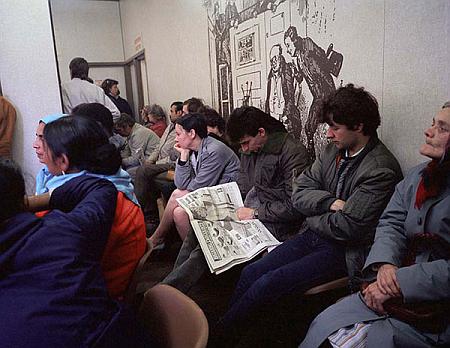
beyond caring
Paul Graham
_______________________
Last Exit to the New Bloomusalem
Ray Davis
Continued from ads without products commenting
on David Foster Wallace's Kenyon College commencement speech
Most of all, Wallace's goals and methodology resemble the little stories Mr. Bloom tells himself in Ulysses to self-medicate his choler (I use them for road-rage myself), or to win some illusion of control or contact, or simply as distraction.
They doesn't much resemble Ulysses, though. Joyce's preeminent quarries probably are having "the worst days of their lives," but they're embedded in so much stuff-of-life that it's difficult to keep that in mind (or even to see it clearly). The book attacks the epiphany-mad heart of high-mainstream narrative rather than just slapping at its surface.
Which is all very nice but doesn't suggest any advice for the graduating class beyond "You might enjoy Ulysses."
_______________________
Intensive Science and Virtual Philosophy [pdf]
Manuel DeLanda
aaaarg - free reg. req.
A philosophical book which refuses to take sides, attempting, for example, to present the work of a philosopher of one camp in the terms and style of the other, may end up being a book without an audience: too Anglo-American for the Continentals, and too Continental for the Anglo-Americans.
Such a danger is evident in a book like this, which attempts to present the work of the philosopher Gilles Deleuze to an audience of analytical philosophers of science, and of scientists interested in philosophical questions. When confronted with Deleuze’s original texts this audience is bound to be puzzled, and may even be repelled by the superficial similarity of these texts with books belonging to what has come to be known as the ‘post-modern’ tradition. Although as I argue in these pages Deleuze has absolutely nothing in common with that tradition, his experimental style is bound to create that impression. Another source of difficulty is the philosophical resources which Deleuze brings to his project. Despite the fact that authors like Spinoza and Leibniz, Nietzsche and Bergson, have much to offer to philosophy today, they are not generally perceived by scientists or analytical philosophers of science as a legitimate resource. For this reason what I offer here is not a direct interpretation of Deleuze texts but a reconstruction of his philosophy, using entirely different theoretical resources and lines of argument. The point of this reconstruction is not just to make his ideas seem legitimate to my intended audience, but also to show that his conclusions do not depend on his particular choice of resources, or the particular lines of argument he uses, but that they are robust to changes in theoretical assumptions and strategies.
_______________________

The Tree of Influence
Charles Rennie Mackintosh
1895
_______________________
The Evolution Jamboree
Graham Foust
O Grace, my show-biz villain days are over!
This poem is brought to you from a pulpit
With the office skills of a cloud. A spectre
Has haunted itself after curfew along
An ash road. Even if I saunter the ice
Barge disguised as a puppet, I'm caught with my
Arms around a cow. If the rain has stopped, are
We fighting? The circus tent had sand in its
Eyes, but the sparkling fox washes its own eyes
Out with its tongue. An eclipse leaked all over
The salon. Love to Grandma and the Senate.
It's an upside down police tactic this bird
Gets around. Take a swig of yarn and call me
If a bug should punch its way through a broken child.
It's not the scariest thing I can think of.
Like a bingo error, I must whisper while
I dry and hum. The careful sled, the stomach
Bugle. The clay boys sang invisible air.
Tangled old boats sent letters to the sick, and
Spent farmers pulled each other from the Middle
Ages. Bethlehem. Prehistory. And food.
|

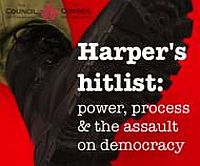

 Janus Head
Janus Head

 The Age of Briggs & Stratton
The Age of Briggs & Stratton


















































